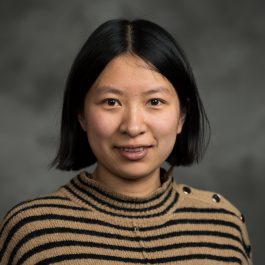Overview
Are you thinking about whether AI methods can enable breakthroughs in your research? Are you seeking collaborators to do so, or methods to build expertise in AI methods within an interdisciplinary research community? On April 3, 2023, faculty members, researchers and trainees, joined MIDAS for a day of insightful presentations and discussions on the latest trends and developments in AI for science and engineering.
Event segments included:
- Talks from prominent researchers and industry leaders who have implemented AI in their own research.
- An introduction to the “AI Carpentries,” a training paradigm that has enabled the Schmidt AI in Science Postdocs to build a strong AI methods community within an interdisciplinary cohort.
- Valuable opportunities to learn how you may adopt AI methods in your own research.
- Advice about how you can connect and collaborate with a broader community of AI methodologists, both within your existing research networks and from other disciplines.
Organized by the 2022 cohort of U-M Schmidt AI in Science Fellows.
Schedule
Associate Dean, Research and Engagment, Professor of Environment and Sustainability, School for Environment and Sustainability and Professor of Environment, Program in the Environment, School for Environment and Sustainability and College of Literature, Science, and the Arts
Computer Vision for Global Scale Biodiversity Monitoring
Abstract:
We require a real-time, modular earth observation system that unites efforts across research groups in order to provide the vital information necessary for global-scale impact in sustainability and conservation in the face of climate change. The development of such systems requires collaborative, interdisciplinary approaches that translate diverse sources of raw information into accessible scientific insight. For example, we need to monitor species in real time and in greater detail to quickly understand which conservation efforts are most effective and take corrective action. Current ecological monitoring systems generate data far faster than researchers can analyze it, making scaling up impossible without automated data processing. However, ecological data collected in the field presents a number of challenges that current methods, like deep learning, are not designed to tackle. These include strong spatiotemporal correlations, imperfect data quality, fine-grained categories, and long-tailed distributions. Our work seeks to overcome these challenges, and includes methods which can learn from imperfect data, systematic frameworks for measuring and overcoming performance drops due to domain shift, and the deployment of efficient human-AI systems that have made significant real-world conservation impact.
Panel Objectives:
A showcase of the Schmidt Fellows’ working groups, also known as “AI Carpentries”, in which Schmidt Fellows bring together their diverse domain and AI expertise to converge on AI methods to enhance scientific discovery. These collaborative communities inspire new ideas and research avenues across domains. The panel will show how faculty can leverage the AI expertise and interdisciplinary community built within the cohort to help with their research.
The panel will be structured around three carpentries with the following focuses:
- New to AI: Understanding the framework of AI models to help researchers get started in the application of AI in science and engineering
- Deep Learning: Exploring the potential and limitations of deep learning in the field of science and engineering.
- Explainable AI: Improving trustworthiness of data-driven modeling in science and engineering using Explainable AI and other relevant methods.
Industrial AI-Augmented Prognostics of Highly Connected and Complex Industrial Systems
Abstract:
Industrial AI, Big Data Analytics, Machine Learning, and Cyber Physical Systems are changing the way we design product, manufacturing, and service systems. It is clear that as more sensors and smart analytics software are integrated in the networked industrial products, manufacturing, and maintenance systems, predictive technologies can further learn and autonomously optimize productivity and performance. This presentation will give an introduction about Industrial AI for smart prognostics systems of highly connected and complex industrial systems. First, Industrial AI systematic approach will be introduced. Case studies on intelligent metrology systems including digital twin-based analytics and advanced Stream-of-Quality (SoQ) technologies for different industrial systems including high-volume manufacturing, networked EVs, and wind turbine systems, etc. will be given. In addition, issues on data quality for high performance and real-time data analytics in future predictive manufacturing and maintenance will be discussed.
Panel Objectives:
Moderated by the Schmidt Fellows, this panel is an opportunity to join the conversation among several U-M faculty members and featured speakers to gain new insights on how to use AI in your research. Prominent faculty across disciplines show how they are leveraging AI for science and engineering breakthroughs. The panelists will discuss their experiences bringing AI advances to their domain fields and answer questions from the audience.
Panelists:
View RecordingStatistical Models for Solar Flare Predictions
Abstract:
We present novel statistical methods towards early forecasting of solar flare events, and compare them with machine learning approaches that we have adopted in our previous work. The data sources that we use include: Geostationary Operational Environmental Satellites (GOES), Solar Dynamics Observatory (SDO)/Helioseismic and Magnetic Imager (HMI) and SDO/Atmospheric Imaging Assembly (AIA). The results that I will show in the talk include: (1) strong and weak flare classification with spatial statistics features, together with SHARP and topological parameters; (2) active region based solar flare intensity prediction with mixed LSTM regression; and (3) tensor Gaussian process contraction model for solar flare forecasting combining data of various types and sources (SHARP parameters, HMI and AIA images).
Machine Learning with Biologically Realistic Neurons
View RecordingAn Introduction to Score-Based Generative Models
Abstract:
Generative models have recently been of increasing interest in machine learning. Score-based diffusion models seem to be especially powerful. This talk will give a tutorial about generative models, especially score-based modeling. Applications in imaging and medical imaging will be mentioned.
The target audience is newcomers to generative modeling. The references in the talk will surely be somewhat outdated, because several new papers on diffusion models will likely appear on arXiv between the time of preparing the slides and presenting them at the symposium.
View RecordingSpeakers

Sara Beery
Incoming Assistant Professor, MIT EECS’ Faculty of AI and Decision Making and CSAIL; Visiting Researcher, Google
Sara Beery is an incoming assistant professor at MIT EECS’ Faculty of AI and Decision Making and CSAIL, and a Visiting Researcher at Google working on Auto Arborist. She has always loved the natural world, and she has seen a growing need for technology based approaches to conservation and sustainability challenges. Her research focuses on building computer vision methods that enable global-scale environmental and biodiversity monitoring across data modalities, tackling real-world challenges including strong spatiotemporal correlations that lead to domain shift, imperfect data quality, fine-grained categories, and long-tailed distributions.
Beery received her PhD in Computing and Mathematical Sciences (CMS) at Caltech, advised by Pietro Perona, where she recieved the Amori Doctoral Prize for my dissertation. She was honored to be awarded both the PIMCO Data Science Fellowship and the Amazon AI4Science Fellowship, which recognize senior graduate students that have had a remarkable impact in machine learning and data science, and in their application to fields beyond computer science. Her work has been funded in part by an NSF Graduate Research Fellowship and the Caltech Resnick Sustainability Institute.

Yang Chen
Assistant Professor of Statistics University of Michigan School of Literature, Science, and Arts, Research Assistant Professor for MIDAS
Yang Chen received her Ph.D. (2017) in Statistics from Harvard University and joined the University of Michigan as an Assistant Professor of Statistics and Research Assistant Professor at the Michigan Institute of Data Science (MIDAS). She received her B.A. in Mathematics and Applied Mathematics from the University of Science and Technology of China. Research interests include computational algorithms in statistical inference and applied statistics in the field of biology and astronomy.

Jeffrey Fessler
William L. Root Collegiate Professor of EECS
University of Michigan College of Engineering
Jeffrey Fessler is a Professor in the ECE Division of the Electrical Engineering and Computer Science department of the College of Engineering, located within the scenic North Campus of The University of Michigan in the terrific town of Ann Arbor, Michigan. He is also affiliated with the Biomedical Engineering Department and with the Division of Nuclear Medicine within the Department of Radiology. His research interests include medical imaging, tomography, nonparametric estimation, and inverse problems, with current and past projects in X-ray CT, MRI, PET, SPECT, radiation therapy, and image registration. He is interested both in developing algorithms for these problems, as well as analyzing and predicting the properties of these algorithms. His group works on a wide variety of imaging projects, both for medical imaging and some non-medical imaging problems.

Daniel Forger
Robert W and Lynn H Browne Professor of Science, Professor of Mathematics
University of Michigan College of Literature, Science, and the Arts
Research Professor, Computational Medicine and Bioinformatics,
University of Michigan Medical School
Daniel Forger is a Professor in the Department of Mathematics devoted to understanding biological clocks. He uses techniques from many fields, including computer simulation, detailed mathematical modeling and mathematical analysis, to understand biological timekeeping. His research aims to generate predictions that can be experimentally verified.

Jay Lee
Clark Distinguished Professor and Founding Director of Industrial AI Center
University of Maryland
Dr. Jay Lee is Clark Distinguished Professor in the Mechanical Engineering of the Univ. of Maryland College Park. He is also the founding director of Industrial AI Center. Previously, he served as Ohio Eminent Scholar, L.W. Scott Alter Chair, and Univ. Distinguished Professor at Univ. of Cincinnati, and was the founding director of National Science Foundation (NSF) Industry/University Cooperative Research Center (I/UCRC) on Intelligent Maintenance Systems in partnership with over 100 global company members. IMS was selected as the most economically impactful I/UCRC in the NSF Economic Impact Study Report in 2012. He mentored his students won first place in the PHM Data Challenges five times since 2008 as well as developed a number of start-up companies including Predictronics through NSF iCorp in 2013.
He was on leave from UC to serve as Vice Chairman and Board Member for Foxconn Technology Group during 2019-2021 to lead the development of Foxconn Wisconsin Science Park (~$1B investment) in Mt. Pleasant, WI. In addition, he advised Foxconn business units to successfully receive five WEF Lighthouse Factory Awards since 2019. He is a member of Global Future Council on Advanced Manufacturing and Production of the World Economics Council (WEF), a member of Board of Governors of the Manufacturing Executive Leadership Council of National Association of Manufacturers (NAM), Board of Trustees of MTConnect, as well as a senior advisor to McKinsey. Previously, he served as Director for Product Development and Manufacturing at United Technologies Research Center (now Raytheon Technologies Research Center) as well as Program Director for a number of programs at NSF.
He was selected as 30 Visionaries in Smart Manufacturing by SME in Jan. 2016 and 20 Most Influential Professors in Smart Manufacturing in June 2020, and received SME Eli Whitney Productivity Award and SME/NAMRC S.M. Wu Research Implementation Award in 2022. His new book on Industrial AI was published by Springer in 2020.

Venkat Raman
Professor of Aerospace Engineering and Professor of Mechanical Engineering University of Michigan College of Engineering
Venkat Raman received his PhD from Iowa State University in 2003 in the department of chemical engineering. Raman was a NASA/Center for Turbulence Research Postdoctoral Fellow at Stanford University from 2003-2004, and a research associate in the Center for Integrated Turbulence Simulations from 2004-2005.
From 2005-2014, Raman was a faculty member of the Aerospace Engineering and Engineering Mechanics Department at the University of Texas at Austin, initially as an assistant professor (2005-2011) and later as tenured associate professor (2011-2014). He now serves as a tenured professor at the University of Michigan in the Department of Aerospace Engineering.
Raman received an NSF CAREER award in 2008, a distinguished paper award at the International Combustion Symposium in 2013, and the Moncrief Grand Challenge Award in 2013. He held the Eli. H and Ramona Thornton Centennial Fellow in Engineering at UT Austin from 2013-2014.
Questions? Contact Us.
Message the MIDAS team: [email protected]
